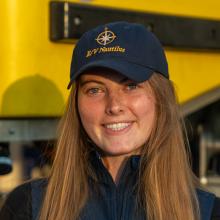
Brooke Travis
Tell us about your work/research. What kinds of things do you do?
Currently, I study microbial symbiosis in the deep sea. I am investigating the relationship between a deep-sea clam and its endosymbionts to determine how the endosymbionts play a role in regulating host metabolism, nutrient flux etc.
What sparked your initial interest in your career?
I must thank my grandmother and her scientific curiosity for sparking my love of the ocean. I remember as a young child, observing patterned seashells and rehabilitating limbless starfish we found on the beach. I found it fascinating that an animal could create intricate shell designs or lose appendages and survive. It was a privilege to glimpse into this world. Our beach strolls were cut short when she passed from stage IV ovarian cancer. I regretted not having more time with her and vowed to understand why. I began to read complex literature regarding cellular communication and mutation rates. I came across an intriguing paper claiming some cancers may be caused by bacteria. In reading similar articles, I realized how microorganisms could influence host health. This channeled my curiosity towards symbiotic relationships.
Who influenced you or encouraged you the most?
My family has always encouraged me to pursue my dream of obtaining a PhD in Biology.
What element of your work/study do you think is the most fascinating?
The lack of knowledge in my field is the most fascinating and exciting part of my work. The deep-sea functions under largely different environmental conditions (cold temperatures, extremely hot hydrothermal vents, minimal oxygen levels, extreme pressure etc.). The way life has thrived and evolved under these conditions is astounding and different from life on land. Life in the deep had to evolve some creative roundabouts to simple everyday things like respiration just to survive. It is the different life strategies of the deep coupled with the current day lack of knowledge that fascinates me the most.
What other jobs led you to your current career?
Of my most recent roles, I participated in the Cornell Ocean Apprenticeship for Lynch Scholars (CORALS) Program, to work on four diverse projects. Two projects developed new methodologies for collecting humpback whale vocalizations and analyzing pteropod shell dissolution associated with ocean acidification. In the first, we deployed a hydrophone-equipped Liquid Robotics Wave Glider (a wave-powered unmanned vehicle) to record and track whale vocalizations. In the second, we used a scanning electron microscope to quantify shell dissolution on pteropods. Our remaining projects focused on organismal health in coral reefs and eel grass beds. We assessed potential coral to algal regime shifts by conducting coral reef surveys along the leeward coast of Hawai’i while considering species abundance, algal herbivores, and terrestrial runoff. Our final project assessed the role of the external microbiome on seagrass blades in the presence of a pathogen, Labyrinthula zosterae. I found this work especially exciting and garnered new skills such as bacterial culturing, streak/replica plating, light microscopy, and hemocytometer counts. Our analysis of the diseased blades raised questions about the hypothesized beneficial role of the microbiome. Additionally, I interned with NOAA Northwest Science Center/USGS Western Fisheries Research Center on a scholarship award. We designed a new qPCR assay to quantify the presence of an intranuclear bacterium in Siliqua patula (razor clam), previously only diagnosed through histology. I extracted over 200 samples, isolated DNA in gel electrophoresis, corrected for PCR inhibition, ran high level qPCR tests, and cross validated with histology. Our qPCR and histology results showed high levels of the bacteria which indicated our qPCR assay was successful.
What are your degrees and certifications?
Bachelor of Science in Biology concentrating in Marine Science--Cornell University 2020;
What are your hobbies?
I recently started a gluten-free cooking channel that consumes most of my free time. I also enjoy weight lifting, scuba diving, and hiking.
How did you get involved with the Ocean Exploration Trust?
My lab was generously invited to join this expedition.
What advice would you give someone who wants to have a career like yours?
I tell everyone who asks me this to never be afraid to make your own path. Marine biology isn't just studying dolphins and whales. There are many intricate intersections of marine biology and other disciplines that are not as mainstream. If you are passionate about multiple research avenues don't be afraid to investigate marine science through a multidisciplinary lens.
Expeditions
Brooke participated in the following Ocean Exploration Trust expeditions:
